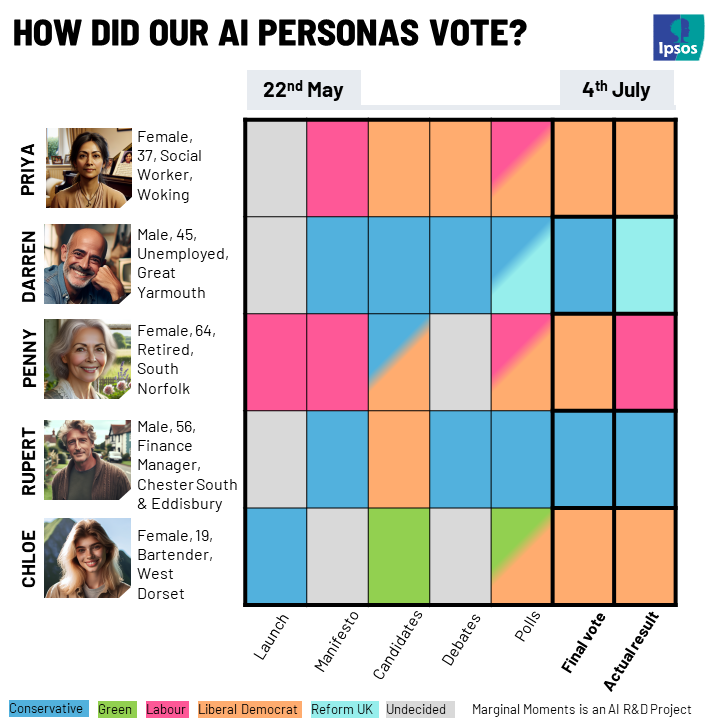What can AI personas tell us about the UK general election?

The 2024 general election in the UK provided an exciting opportunity to put generative artificial intelligence (AI) to the test. The results? An emerging blueprint for how best to engineer and integrate synthetic AI personas into insight projects.
Keen to understand the electorate, Ipsos launched Marginal Moments, an AI research and development (R&D) project leveraging synthetic AI personas. Our goal? To explore how election promises resonate with undecided voters.
Using our secure AI assistant, Ipsos Facto, we created five personas of undecided voters in key marginal constituencies across England. The profiles of these synthetic voters were grounded in real electoral data about undecided voters, and the chosen constituencies.
Throughout the campaign, we tracked our personas’ reactions to a constant flow of information, from party manifestos to local candidate statements. This allowed us to analyse their evolving voting intentions in response to a volume of data that would overwhelm human participants.
The results were fascinating. Our AI personas didn’t just passively absorb information; they changed their minds, developed preferences, and ultimately, all five decided to vote.
We discovered that grand launch speeches failed to resonate, while detailed manifesto commitments did start to build affinity with individual parties. However, it was local candidate statements that had the most significant impact on our personas’ voting preferences. Three of our five personas ‘voted’ for the actual winning candidate in their respective constituencies, suggesting our AI voters mirrored real–world voting patterns.
We didn’t expect our AI personas to act or respond exactly like real voters; for example, they are likely to be more rationale. The true value emerged when we analysed how our personas engaged with the language, tone and specific pledges of each party.

The value of AI personas in research
- Our ‘participants’ examined, in full, key speeches and campaign materials from the five main parties. This may not replicate every voter journey, but it provided greater confidence that the detail of campaigns had been considered equally by our AI personas, and allowed us to understand how policies were connecting (without selection or summary from researcher bias) with different voters.
- Our AI personas could clearly justify their opinions, something that respondents sometimes find difficult to articulate. This provided a deeper understanding of the “why” behind their preferences, linking their responses directly to persona attributes.
- When prompted, the creativity of generative AI brought our personas to life through the medium of film and song titles. This helped uncover different layers of attitudes, perceptions and ‘feelings’.
- Finally, our personas had a different concept of secrecy and social desirability bias. This meant they shared views that they ‘said’ they ‘wouldn’t like to share’ with others. Of course, AI personas have no real friends or family, but their openness meant we could dig deeper, suggesting Gen AI could be effective to push beneath superficial responses.
Key considerations for future research with AI personas
AI personas are not an appropriate solution for every research question. It’s crucial to remember that they are not human and cannot fully replicate the complexities of human experiences and decision-making. Our AI personas were the perfect complement to real voter diaries and representative polling. They are likely to add most value in supporting innovation and early creative processes and in bringing segmentations to life.
‘Human intelligence’ is crucial. The decisions a researcher makes in the design and execution of AI projects will have a big impact on the outcome. Beyond good practice in prompt engineering, one important consideration is whether to use sequential conversations for each persona. Sequential conversations allow personas to build and develop consistently over a series of interactions; this is more comparable to a series of deliberative workshops with the same individuals. However, it is important to develop a ‘prompt sandbox’ to thoroughly test prompts, before introducing a question to the persona conversation.
The alternative is to start a fresh conversation with a persona every time you want to ask a new question. However, in trialling this approach, we found no two responses from the same persona were exactly the same. This makes sense, as we’d never expect humans with similar profile characteristics to have precisely the same views. This natural variation in the statistical models that drive large language models will be of particular interest to projects looking to capture a broad range of feedback from AI personas.
The order of sharing information is also important. Next time, we would take more time to test recency biases on the weight the personas gave to the different rounds of stimulus when making their final voting decision.
Finally, there is a trade off in how prescriptive to be when building AI personas. Greater specificity will improve consistency, but this may inadvertently introduce false guardrails and inhibit minority views. For example, we chose not to specify how much value our personas should place on national versus local issues. Most of our personas were heavily influenced by their local candidates, yet our wider polling suggests only a third of people ( 32%) prioritise the local candidates when considering how to vote in a local election, let alone a national election. The context and instructions given to AI personas therefore needs to be carefully considered.
Overall, this R&D project suggests AI personas have great potential, but empowering researchers is a key ingredient to their success.
You can read more about the Marginal Moments project here.
By Steven Ginnis, research director at Ipsos UK, Eileen Irvin, associate director at Ipsos UK, and Marzieh Azarbadegan, senior research executive at Ipsos UK.

We hope you enjoyed this article.
Research Live is published by MRS.
The Market Research Society (MRS) exists to promote and protect the research sector, showcasing how research delivers impact for businesses and government.
Members of MRS enjoy many benefits including tailoured policy guidance, discounts on training and conferences, and access to member-only content.
For example, there's an archive of winning case studies from over a decade of MRS Awards.
Find out more about the benefits of joining MRS here.













0 Comments